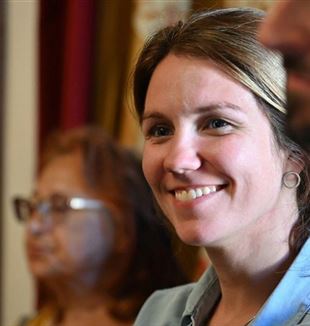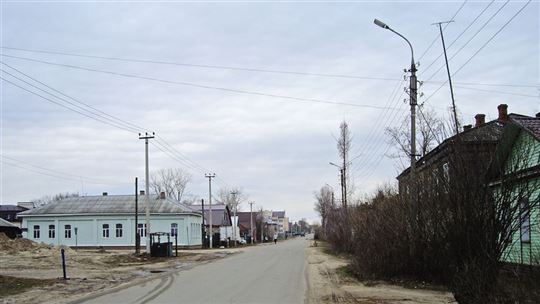
Russia: An unpredictable unity
Darina lives in a small village near Vladimir. She became a teacher "so that the children would encounter the same gaze that I met." That gaze which for her has overcome all loneliness. From the November issue of Tracce.It happened in 2017. I had a family and a more than peaceful life, but inside I felt restless. My heart wanted more, everything seemed not to be enough. That year I did an internship in Italy, as a student, and met some people from CL there. For the first time in my life, I was confronted with something completely different. Deep in their gaze I saw the answer to my heart's need. They lived this answer, so they looked at me and the world differently. I wanted to look at everything as they did. I wanted my eyes to shine like the teacher of a small Italian school when she looked at her students. I wanted my life to have the joy that I felt in the words of those who worked at Russian Cristiana and who had welcomed us. Above all, I wanted to know the secret of life, which they knew. I found out later that the people who had impressed me were part of the Memores Domini. But it took me years, full of questions and encounters, to understand the meaning of this fact, the origin of their attraction. Now I can say that Christ found the way to my heart through this friendship. But I did not understand it at first. Yet when I returned to Russia, I did two things: I found work in a school and started going to church again.
Little by little, through my first friends, I began to involve myself in the life of the movement in Russia. At first I was sad and tired because I live in Sudogda, a small town near Vladimir, far away from the Moscow community. But the desire to belong to the gaze that fascinated me, to this place and these people, who became for me the embodiment of Christ's embrace, was the reason I asked to join the Fraternity in 2019.
But even this was not enough. I had to learn to live reality with all its challenges where I live. I remember that when my father died, at the funeral, the priest long and confidently repeated that one should not cry, because it is a sin. His words did not help me, on the contrary. But suddenly I felt a friend embracing me from behind my back, who had come there, three hundred kilometres from Moscow, to be with me. She did not say anything, she just hugged me. That is when I realised that the important thing is not words and consolations, but a living presence that embraces you, allowing you to cry when it hurts and at the same time reminding you that you are never alone.
This became even more evident to me in 2020. It was a terrible time: the pandemic started, people were dying every day, and my husband and I divorced. My family fell apart. But I remember that period with gratitude: many people spoke of loneliness, and I, on the contrary, felt embraced on all sides. Surprisingly, it was through physical loneliness that, through simple everyday things, I began to discover the constant presence of Christ in my life.
Step by step, within different situations, this intuition became certainty. I will only recount how this occurred for me in my work. I became a teacher because I felt a strong desire for the children in the school where I teach to encounter the same gaze that I did. Realising that this is not only conveyed through words, I invited some of my teacher friends from the movement. And they accepted, so we started annual meetings, which did not stop even remotely during the pandemic. My colleagues, knowing nothing of our belonging, but only looking at the friendship between us, started talking about us by saying 'you', emphasising a visible unity, not at all created by our own efforts. This was surprising and even attracted people distant from the Church. So at the beginning of last year, in an increasingly difficult situation because of the war, the headmistress came to me and said: “Preserve your friendship with these people for all of us.” And when we were waiting for our friends from Italy to arrive this winter, she asked that the meeting with the children be dedicated not to literature, but to a conversation about life, because “it is much more important, especially now.”
I was surprised that she went deeper than her impressions and realised the value of this different gaze not only for herself, but also for others. And this pays off: children who grow up alongside these adults learn to notice unexpected things. This summer, after a weekend with our students and some teacher friends of the movement, a girl wrote: “I think there is something more inside you, something that can shine and light the way for others.” It gives me the shivers, because I realise that I too have encountered this 'something more'. Just as Christ mysteriously chose some people to become a fact of reality for me, becoming flesh in my life, so now he has chosen me and my friends to meet the young people of a small village near Vladimir.
But passing on this testimony does not depend on our efforts, nor on the number of initiatives. I often risk forgetting what makes them fruitful: the gift of Christ's presence among us. At a certain point, I discovered that I needed someone who could constantly help me to go deeper, to the source of everything that was happening in my life, including my professional life. I shared these thoughts with other teachers and unexpectedly discovered that many of them needed the same thing.
Thus were born the online meetings for teachers, which I and my colleagues in the movement organized together to 'focus' the gaze. They took place throughout the school year. Before the holidays, we received several letters from participants. One person wrote: "It was an opportunity to see and hear people who not only teach, but accept and understand teaching as a vocation. Suddenly I seem to be looking at something I know from a different perspective, from a different angle, and it seems new, unknown and so attractive. What it means is not yet clear to me, but I know that I am grateful for this opportunity and I want to keep looking and listening carefully, to see what it can mean in my life, my work and my vocation."
Read also - Greece: "My church of migrants"
Thus, through very simple everyday things, it is revealed to me that there is an answer to my heart's desire: a God who did not remain in heaven, but became man, Christ, and who promised: "I am with you always, until the end of time". He keeps his word, coming to me through people and circumstances. And all I ask is to have eyes that can see His presence every day.